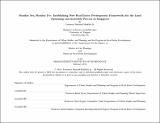Monkey see, monkey do : establishing new real estate development frameworks for the land optioning and assembly process in Singapore
Author(s)
Harkless, Lawrence Bernard, Jr
DownloadFull printable version (25.39Mb)
Other Contributors
Massachusetts Institute of Technology. Center for Real Estate. Program in Real Estate Development.
Advisor
Brent Ryan.
Terms of use
Metadata
Show full item recordAbstract
Development projects ultimately create places in the built environment. As such, the developer should be concerned with the quality of spaces they create for those in the community to interact within. For this reason, a structural framework should be established to allow developers to understand the needs of the various communities in which they develop. The focus of this thesis is not upon traditional notions of community engagement, which is primarily focused on short-term decisions and development implications. Rather the structural framework proposed in this thesis takes a long-term approach to development and views community involvement as a win-win situation in which all parties involved are better off. In order for this framework to be implemented, a large-scale embrace of strategic planning that facilitates and guides development is needed. This requires that community engagement be addressed at the onset of the development process, more specifically, the land optioning and assembly process. This thesis combines parametric design theory and community engagement in the ideal state of Singapore, with the goal of establishing a stakeholder framework that could be applied to the land optioning and assembly process for the Eco-Town development of Punggol. The intent of this thesis is to establish a stakeholder framework that provides an opportunity for the land optioning and assembly process to be more systematically understood. Using parametric design thinking theoretically allows each stakeholder to have control over various aspects of the land optioning process. Realistically, the developer could observe the impacts that occur when different stakeholders engage in this process. Ultimately, this framework provides the developer with a better methodology to understand stakeholder engagement as a component of their development projects. The hope is to generate ideal development and planning process ideals that can allow individuals to have a greater impact in the communities in which they reside.
Description
Thesis: M.C.P., Massachusetts Institute of Technology, Department of Urban Studies and Planning, 2014. Thesis: S.M. in Real Estate Development, Massachusetts Institute of Technology, Program in Real Estate Development in conjunction with the Center for Real Estate, 2014. Cataloged from PDF version of thesis. Includes bibliographical references (pages 118-122).
Date issued
2014Department
Massachusetts Institute of Technology. Center for Real Estate. Program in Real Estate Development.; Massachusetts Institute of Technology. Center for Real Estate; Massachusetts Institute of Technology. Department of Urban Studies and PlanningPublisher
Massachusetts Institute of Technology
Keywords
Urban Studies and Planning., Center for Real Estate. Program in Real Estate Development.